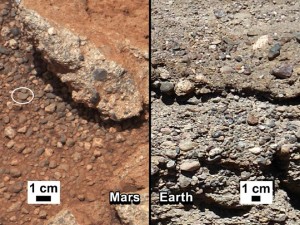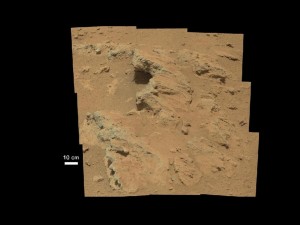NASA scientists use the Swift satellite to discover a new black hole in the Milky Way.
Category: Astronomy (page 6 of 9)
From Scientific American:
The most precise measurement ever made of the speed of the universe’s expansion is in, thanks to NASA’s Spitzer Space Telescope, and it’s a doozy. Space itself is pulling apart at the seams, expanding at a rate of 74.3 plus or minus 2.1 kilometers (46.2 plus or minus 1.3 miles) per second per megaparsec (a megaparsec is roughly 3 million light-years).
If those numbers are a little too much to contemplate, rest assured that’s really, really fast. And it’s getting faster all the time.
More here.
on MARS!
Curiosity has taken pictures that suggest that there was once a fast moving stream of water on the planet Mars. Photos of rocks on the planet’s surface are surprisingly similar to rock formations formed in ancient streambeds here on Earth. From Associated Press:
The NASA rover Curiosity has beamed back pictures of bedrock that suggest a fast-moving stream, possibly waist-deep, once flowed on Mars — a find that the mission’s chief scientist called exciting.
There have been previous signs that water existed on the red planet long ago, but the images released Thursday showing pebbles rounded off, likely by water, offered the most convincing evidence so far of an ancient streambed.
There was “a vigorous flow on the surface of Mars,” said chief scientist John Grotzinger of the California Institute of Technology. “We’re really excited about this.”
The discovery did not come as a complete surprise. NASA decided to plunk Curiosity down inside Gale Crater near the Martian equator because photos from space hinted that the spot possessed a watery past. The six-wheeled rover safely landed Aug. 5 after a nail-biting plunge through the Martian atmosphere. It’s on a two-year, $2.5 billion mission to study whether the Martian environment could have been favorable for microbial life.

